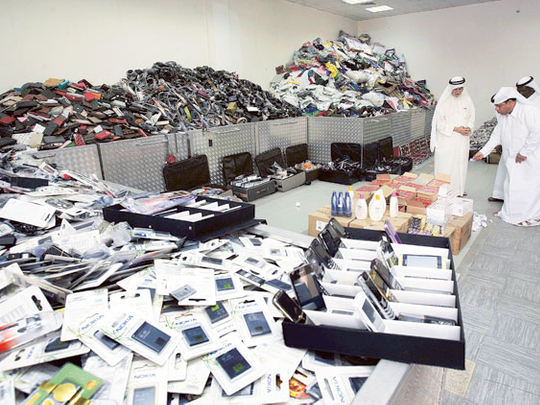
Dubai: The counterfeit market in the UAE was worth approximately $5 billion (Dh18.3 billion) for 2012, the Chairman of the 33-member Brand Owners’ Protection Group (BPG) Omar Shtewi told Gulf News.
He warned that the situation is worsening as counterfeiters have developed the ability to create close to identical copies of their authentic counter-parts. According to International Chamber of Commerce (ICC) forecasts, the value of counterfeit goods globally is expected to surpass $1.7 trillion by 2015.
For companies registering trademarks they own in the UAE, the registration procedures are long and they can do nothing if counterfeits enter the market meanwhile. The trademark registration process in the UAE, for both domestic and international companies, is also strenuous and costly; it takes up to two years, with costs totalling up to Dh5,750. This can make the wait painstakingly long for companies with unregistered trademarks that want to take legal action against counterfeiters.
“If during the registration process any fake goods are imported into the country, then the actual owner of the trademark cannot take legal action against the violators due to lack of ownership certificate,” said Jitendra Gianchandani, chairman and managing partner at Jitendra Consulting Group.
In order to prevent counterfeiters selling fake goods under brand-names, companies must first register a unique trademark. The UAE recorded around 1,500 to 2,000 trademarks each month in 2012, according to Imran Qureshi, business development team manager at Horwath Mak. Trademarks, used by both domestic and international companies, are symbols of ownership of goods and services, much like patents and copyrights. Counterfeit goods result in trademark infringement, which can lead to lawsuits against counterfeiters. These can be very time-consuming and costly.
Fortunately for well-known global companies, they need not wait too long as they are not required to register their trademarks in each Middle Eastern country separately; they also have the privilege of getting automatic protection from counterfeiters. However, they are still not quite out of the woods as there are counterfeits of their goods floating around.
Dubai Customs, in some cases, help companies without ownership certificates tackle counterfeiters by blocking the entry of knockoff products that include everything from electronics and cosmetics to textiles and pharmaceuticals.
The most counterfeited products in the UAE are spare auto parts, adds Shtewi. Other counterfeit products that top the list include cigarettes, household appliances, toiletries, and skin care products.
Last month, there was a big raid by Dubai government that resulted in the confiscation of more than 60,000 fake auto parts worth Dh3 million. The majority of the parts were knockoffs of major Japanese automakers, including Toyota and Mitsubishi.
Although the Department of Economic Development is regularly monitoring offences and penalties for trademark infringements and sales of counterfeit products in the country, stricter measures should be taken to stop the proliferation of counterfeit goods, says Shtewi. “Trademark law number 37 of 1992 should be amended so penalties can be more severe,” he added.
Trademark law number 37 includes the issuing of licenses to companies to use trademarks, and penalties to those that infringe trademark law. Shtewi said that there should be closer inspection of imported containers for counterfeits, no more re-exports of said products, and better communication with brand owners. Courts should also impose heavier fines on those that infringe trademark law, he added.
Knockoff products can lead to huge financial losses by the government and companies. In 2006, the UAE has lost between $670 and $696 million due to counterfeits, according to research by BPG. For Unilever it can lead to “a loss of the consumers’ trust” in brands, said Arijit Ghose, managing director of Unilever Gulf. Over 90 per cent of Unilever’s products are counterfeited, with home and personal care products topping the list. However, he added that Unilever has established a brand protection team that works with global agencies to combat counterfeits.
Ghose cautions consumers that view counterfeits as a bargain. “Counterfeit products can cause severe consequences on the health of the person who uses them and in some cases their usage and consumption could be life threatening and fatal. My strong recommendation to consumers therefore is to not make their buying decision based on the price of the item alone. Saving a little bit of money now, can cause a great loss in the future...sometimes in terms of a person’s health because of the harmful ingredients that are used to get this counterfeit products cost down.”
Sarah Algethami is a trainee at Gulf News.












